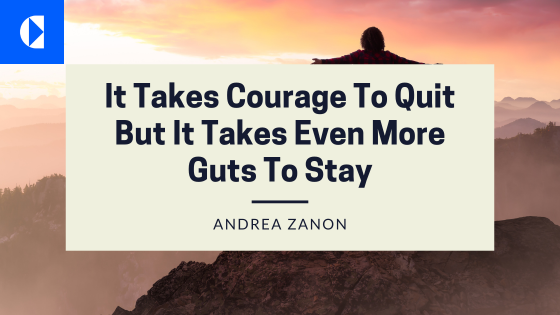Quidding is often associated with giving up. Wrong! Quitting is also a courageous decision of self-disciplined people with resolve and ambition. The type of quitting I am interested to discuss is the one that relates to our career choices that led to self-affirmation, happiness, and success. Millions of people are stuck in their jobs, and they don’t see future growth, both financially and personally. Many of these people face the daily challenge of neither being able to contribute to their business growth, nor to their personal learning. The challenge goes further, as many are unable to define why they do what they do and cannot measure progress towards success. My advice to all is, when these difficulties become the norm, and you don’t see where you are headed, it is time to quit. It is time to change as it will be irresponsible to stay. If you stay it would ultimately lead to personal misery, and for misery of the people you love the most and plus it will lead to mediocrity.
You Are the Most Valuable Asset
Quitting becomes easier when we experience an epiphany. Moments in which we find our voice, and we find what motivates us and stop putting up with unhappiness. If we let this inner voice guide us, we will increase our self-esteem and motivation. Ultimately this is the path to build your own dream and invest in yourself for the rest of your life. When you invest in yourself you start appreciating that you are the most valuable asset, and that you are building expertise that nobody can take away from you. The more you invest in yourself the higher value you acquire, and as the billionaire investor Warren Buffett says, “the more you learn the more you earn”. He also reminds us that, “nobody can tax your education and expertise” and expertise appreciation does not get eroded by inflation.
The Day I Decided to Quit
I left a high paid job at an International Financial Institution in Washington DC, where I reached a level of seniority and compensation that I never thought possible. I advised 20 Ministers of Finance, I became the Confidante of Heads of States and Sovereign Wealth Funds and powerful Royal family members in Saudi Arabia, the Emirates and Qatar. However, to fit in this job profile I had to give up joy. I could no longer justify why I kept doing what I was doing. And even worse, I did not have a clue how to measure my work impact or contribution to societal improvement. That was the turning point for me. I decided to build an exit plan, started networking like crazy, and quit six months after. When I did, many people around me told me that I was crazy and irresponsible. Once I quit, I proved to the world and to myself that I could do it, and I quickly regained the self-esteem needed to get back on my feet, reskill and build the path to success and happiness.
Final Thought: You shouldn’t quit your work because it is hard. There are lots of difficult tasks we perform daily that are instrumental to become happy and successful. What you need to do is explore as much as possible to find these activities that you’re passionate about, and when you find them, stick with them even when they are painful. You shouldn’t spend your time on things that aren’t worth pursuing as this prevents you from being able to spend time on things you love.
The key obstacle to overcome when quitting is the “sunk cost fallacy”. The sunk cost fallacy occurs when we feel that we have invested too much to quit. This mental trap causes us to stick with an awful plan even if it no longer serves us and the costs clearly outweigh the benefits. As Angela Duckworth says in her great book Grit “let’s not get hung up on the idea that if you stick to anything, you’ll succeed. You must stick to the right things”.
Everybody needs a good quitting coach.” And I was like, “Oh, what do you mean by that?” And he said, “They need someone who will tell them the hard things that they need to hear when they can’t see it for themselves, because we can never see these things for ourselves.”

